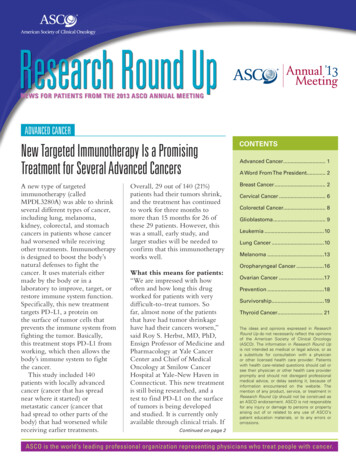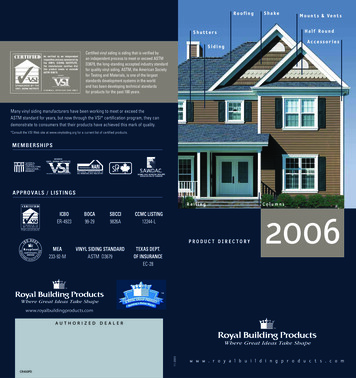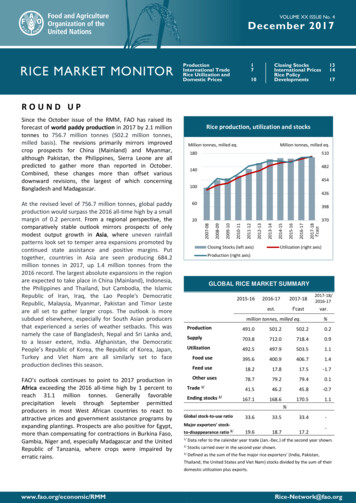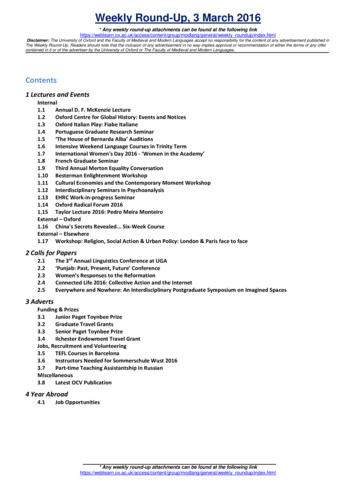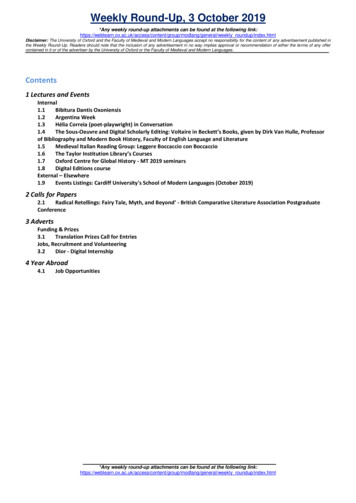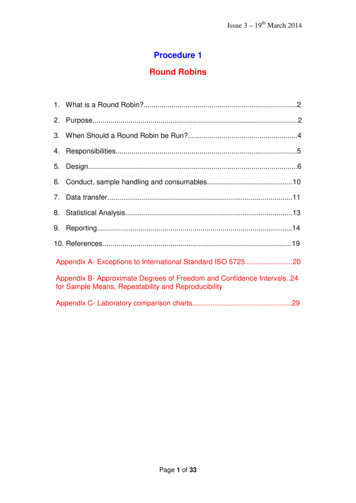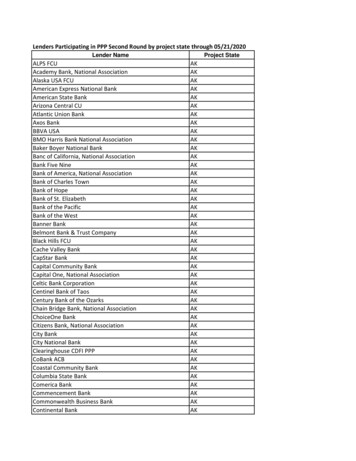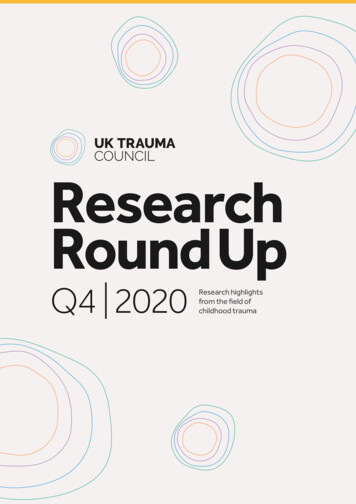
Transcription
ResearchRound UpQ4 2020Research highlightsfrom the field ofchildhood trauma
Cutting edge research on trauma & childhoodmaltreatment. The Research Round Up series helps to bridgethe gap between academic researchers and busy professionals.This publication provides summaries of ten research studiesfrom the field of trauma and childhood maltreatment publishedduring the fourth quarter of 2020.ContentsInterventionsImpact of trauma3Building more inclusive and equitabletreatment guidelines for childhood trauma8A possible window of opportunity followingearly-life trauma in adolescence4A systematic review of interventions formaltreatment-related child posttraumaticstress disorder (PTSD)9Early adversity and effects on braindevelopment5Psychological treatment for traumaexposed children in El Salvador6How to improve the detection ofsymptoms and treatment delivery foryoung people with trauma-related mentalhealth difficulties7Long-term improvements in symptomsamong carers who participate in traumafocused family-based psychologicaltreatment for child and adolescent PTSD10 Different dimensions of childhoodmaltreatment may be associated withdifferent types of mental health difficulties11 The impact of trauma and hardshipon parenting behaviour in vulnerablecommunities12 The impact of childhood victimisationand loneliness in childhood and youngadulthood
InterventionsBuilding more inclusive and equitable treatmentguidelines for childhood traumaIn this commentary, Alisic and colleagues (2020)discuss how clinical practice guidelines for thetreatment of traumatic stress can become moreinclusive and equitable for children and youngpeople. After reviewing international traumatreatment guidelines, the authors identify twoareas for possible improvement: (1) increasing therepresentation of children’s cultural backgroundand (2) creating opportunities for children’s voicesto be heard. The authors highlight that currentinternational guidelines offer little information onhow to tailor treatment to young people’s culturalneeds. Furthermore, the authors underscorethat there is limited diversity across all the stagesof the guideline development process (includingthe evidence-base itself). The narrow focuson high-income western countries and whitepopulations poses a serious barrier to identifyingand addressing ethnic and cultural issues. Theauthors also report that young people were notconsulted and included in the development ofclinical practice guidelines. Finally, they identifyResearch Round Up Q4 2020concrete steps to address these issues: settingup committees for the consultation and cocreation of clinical guidelines with young peopleand their families; involving experts fromdifferent fields (e.g. anthropology, sociology);and identifying existing culturally-relevantresearch and culturally-competent treatmentadaptations. In sum, the authors arguethat promoting research and developingtreatment guidelines “with, by and for”under-represented groups should take highpriority to move the fields towards greaterinclusivity and equity.Alisic, E., Roth, J., Cobham, V., Conroy, R., De Young, A.,Hafstad, G., Hecker, T., Hiller, R., Kassam-Adams, N.,Lai, B., Landolt, M., Marsac, M., Seedat, S. and Trickey,D., (2020). Working towards inclusive and equitabletrauma treatment guidelines: a child-centeredreflection. European Journal of Psychotraumatology, 11(1),p.1833657. doi: 10.1080/20008198.2020.18336573
InterventionsA systematic review of interventions formaltreatment-related child posttraumaticstress disorder (PTSD)Childhood abuse and neglect is associatedwith an increased risk of developing PTSD. Theevidence-base for psychological interventionsfor PTSD in children and adolescents is wellestablished. Yet, there is an ongoing debateabout the suitability and appropriateness ofthe existing therapeutic approaches for thetreatment of young people who have beenexposed to more complex traumatic experiences,such as maltreatment. The Bennett andcolleagues (2020) review builds on Leenartset al (2013) to provide an update on theevidence-base of psychological interventionsfor maltreatment-related PTSD. Twenty studieswere selected. Ten were from the US, five fromEurope, two from Africa, two from Asia and onefrom South America. Nine studies reported amajority of participants who self-identified asWhite or Caucasian, three reported majority ofparticipants who identified as Black, one reportedmajority Hispanic and one majority Latino orWhite/Latino. Six studies did not describe theethnicity of the sample. The authors report thattrauma-focused cognitive behavioural therapyResearch Round Up Q4 2020(TF-CBT, a manualised family-focused treatmentdeveloped by Cohen, Mannarino and Deblinger)remains the best supported psychologicalintervention for young people following childhoodmaltreatment. New studies suggest thatimprovement in symptoms is maintained up to1-year after treatment ends. Also, initial evidencesuggests the suitability of this therapeuticapproach in lower-middle income countries.Other cognitive behavioural based interventionswere identified as promising, including prolongedexposure (PE). The evidence for other therapiesremains limited. In sum, current evidencesuggests that TF-CBT may be an effectivetherapeutic approach for maltreatmentrelated child PTSD. The effectiveness ofother therapeutic modalities remains largelyunexplored.Bennett, R. S., Denne, M., McGuire, R., & Hiller, R. M.(2020). A systematic review of controlled-trials forPTSD in maltreated children and adolescents. Childmaltreatment, Advance online publication. https://doi.org/10.1177/10775595209611764
InterventionsPsychological treatment for trauma exposedchildren in El SalvadorTrauma-focused cognitive-behavioural therapy(TF-CBT) is a manualised family-focusedtreatment protocol for traumatised youngpeople (and their non-offending caregivers)developed by Cohen, Mannarino and Deblinger.TF-CBT has a robust evidence-base, with morethan 20 trials showing its effectiveness. Yet,to date, TF-CBT has not been systematicallyimplemented nor evaluated in any Latin Americancountry. Stewart and colleagues (2020), inthis study, trained providers in TF-CBT andevaluated its feasibility and effectiveness in ElSalvador, one of the countries with the highestrates of violence and homicides in the world.Fifteen Salvadoran psychologists were trainedin TF-CBT. They then provided treatment to121 Salvadoran young people in the community.The result of this study indicate that it was (1)Research Round Up Q4 2020feasible to train local providers in TF-CBT, (2)treatment completion rate was high (86%),and (3) young people experienced a large andclinically meaningful reduction in traumasymptoms at the end of treatment. In sum, thisstudy provides preliminary evidence forthe implementation and effectiveness ofevidence-based trauma-focused treatmentfor young people in Central America.Stewart, R. W., Orengo-Aguayo, R., Villalobos, B. T.,Nicasio, A. V., Dueweke, A. R., Alto, M., . & de Arellano,M. A. (2020). Implementation of an Evidence-BasedPsychotherapy for Trauma-Exposed Children in a LowerMiddle Income Country: the Use of Trauma-FocusedCognitive Behavioral Therapy in El Salvador. Journal ofChild & Adolescent Trauma. Advance online 27-95
InterventionsHow to improve the detection of symptomsand treatment delivery for young people withtrauma-related mental health difficultiesIn this commentary, Danese and colleagues(2020) argue that the assessment and treatmentof trauma-related mental health difficultiesamong young people lags behind internationalclinical guidelines and current research. Youngpeople with trauma-related psychopathologyoften go undetected. To receive the best possiblecare, young people must be able to promptlyaccess effective treatment. The authors proposefour ways to improve the detection of childhoodtrauma-related mental health difficulties: (1) toimprove current understanding of the barriersto healthcare use (e.g. stigma, hopelessness,socio-economic factors); (2) increase theimplementation of screening procedure inprimary care or non-specialist health settings(e.g. schools); (3) develop accurate predictionmodels to identify those young people atgreatest risk of developing trauma-relatedResearch Round Up Q4 2020mental health difficulties; (4) improve knowledgeand skills around child and adolescent mentalhealth among primary care practitioners (e.g.GPs, nurses). The authors argue that child andadolescent mental health professionals needmore specialist training and clinical capacity. Thiswill help to improve the treatment of traumarelated mental health difficulties. In sum, thisarticle argues that adequate screeningprotocols and prompt access to specialistevidence-based treatment is paramount toimprove care provision for trauma-exposedyoung people.Danese, A., McLaughlin, K. A., Samara, M., & Stover,C. S. (2020). Psychopathology in children exposed totrauma: detection and intervention needed to reducedownstream burden. BMJ (Clinical research ed.), 371,m3073. https://doi.org/10.1136/bmj.m30736
InterventionsLong-term improvements in symptoms amongcarers who participate in trauma-focusedfamily-based psychological treatment for childand adolescent PTSDParents of traumatised young people frequentlydevelop trauma-related symptoms of their own.This, in turn, might negatively affect a youngperson’s symptoms and response to treatment.Trauma-focused cognitive-behavioural therapy(TF-CBT) is a well-established treatment forchildren and adolescents with PTSD manualisedby Cohen, Mannarino and Deblinger. Unlike othertrauma-focused psychological interventions, inTF-CBT non-offending carers (i.e. parents whodid not perpetrate the trauma for which the childor young person is receiving treatment) playa crucial role in treatment. In this study, Tutusand colleagues (2020) investigated if symptomimprovement among parents who participate inthe treatment delivered for their child’s PTSD issustained up to one year after treatment. The 57parents who took part in this longitudinal studywere primarily of German origin (80%), had awide range of ages (29-59 years) and educationalResearch Round Up Q4 2020backgrounds. The authors found that parentsexperienced substantial improvements indepression, anxiety, trauma-related symptomsand negative post-traumatic cognitions up toone year after treatment. Interestingly, this wasnot affected by parental trauma history. In sum,the results of this study highlight the longterm mental health benefits for parents whoparticipate in their child’s trauma-focusedtreatment.Tutus, D., Pfeiffer, E., Plener, P. L., Rosner, R., Bernheim,D., & Sachser, C. (2020). The Change in ParentalSymptoms and Dysfunctional Cognitions in the Courseof Trauma-Focused Cognitive-Behavioral Therapy:Sustainability Until One-Year Post-Treatment. Journalof child and adolescent psychopharmacology, 10.1089/cap.2020.0097. Advance online publication. https://doi.org/10.1089/cap.2020.00977
Impact of TraumaA possible window of opportunity followingearly-life trauma in adolescenceResearchers hypothesise that duringadolescence, young people experience a periodof heightened sensitivity to the caregivingenvironment. As such, this developmental stagemay represent a uniquely favourable period forrecovery of function among individuals exposedto severe early psychosocial deprivation. Inthis study, Colich and colleagues (2020),investigated whether the quality of caregivingamong Romanian adolescents is associatedwith better functioning among young peoplewho had experienced early institutionalisations/deprivation (n 187) and community–raised peers(n 78). Three domains of functioning – rewardprocessing, executive function and mentalhealth – were examined at ages 8, 12, and 16.The researchers found a positive associationbetween higher quality of adolescent caregivingResearch Round Up Q4 2020and greater reward sensitivity and executivefunction performance at both ages 12 and 16.Moreover, higher caregiving quality was alsolinked with less mental health difficulties at age16. In sum, these findings support the notionthat adolescence may represent a window ofopportunity for recovery — even followingextreme forms of early deprivation.Colich, N. L., Sheridan, M. A., Humphreys, K. L., Wade,M., Tibu, F., Nelson, C. A., Zeanah, C. H., Fox, N. A.,& McLaughlin, K. A. (2020). Heightened sensitivityto the caregiving environment during adolescence:implications for recovery following early-life adversity.Journal of child psychology and psychiatry, and allieddisciplines, 10.1111/jcpp.13347. Advance onlinepublication. https://doi.org/10.1111/jcpp.133478
Impact of TraumaEarly adversity and effects on braindevelopmentThis study by Hein and colleagues (2020)examined if two dimensions of early adversity,social deprivation and violence exposure, havedistinct effects on brain development. Thesample of young people (n 167) recruited forthis study had substantial representation ofunderstudied youth, including Black/AfricanAmericans (70%) and adolescents from lowincome families. The authors focused theiranalyses on brain regions which play a central rolein threat and reward processing (i.e. the amygdalaand ventral striatum, respectively). There weretwo main findings. First, early violence exposurewas linked with more sustained brain activationin response to threat-related social cues (i.e.angry faces). Second, early social deprivation wasassociated with decreased brain activation toResearch Round Up Q4 2020socially rewarding cues (i.e. happy faces). Thesefindings were independent of current levels ofsymptoms of depression and anxiety as well ascurrent life stress. In sum, this study providessupporting evidence for theories thatsuggest threat and social deprivation (twodimensions of early adversity) may haveoverlapping but also distinct effects on braindevelopment.Hein, T. C., Goetschius, L. G., McLoyd, V. C
4 Interventions Research Round Up Q4 2020. Trauma-focused cognitive-behavioural therapy (TF-CBT) is a manualised family-focused treatment protocol for traumatised young people (and their non-offending caregivers) developed by Cohen, Mannarino and Deblinger. TF-CBT has a robust evidence-base, with more than 20 trials showing its effectiveness. Yet, to date, TF-CBT has not been
